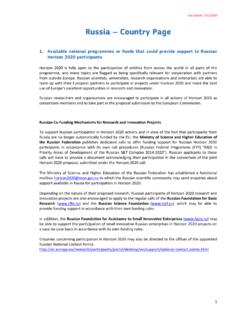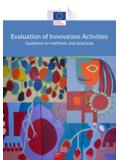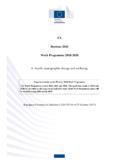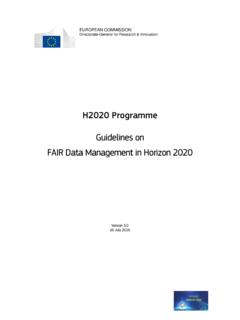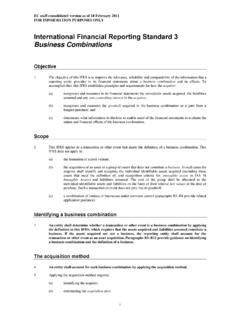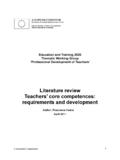Transcription of WHITE PAPER On Artificial Intelligence - A European ...
1 EN EN European COMMISSION Brussels, COM(2020) 65 final WHITE PAPER On Artificial Intelligence - A European approach to excellence and trust 1 WHITE PAPER on Artificial Intelligence A European approach to excellence and trust Artificial Intelligence is developing fast. It will change our lives by improving healthcare ( making diagnosis more precise, enabling better prevention of diseases), increasing the efficiency of farming , contributing to climate change mitigation and adaptation, improving the efficiency of production systems through predictive maintenance, increasing the security of Europeans, and in many other ways that we can only begin to imagine.
2 At the same time, Artificial Intelligence (AI) entails a number of potential risks, such as opaque decision-making, gender-based or other kinds of discrimination, intrusion in our private lives or being used for criminal purposes. Against a background of fierce global competition, a solid European approach is needed, building on the European strategy for AI presented in April 20181. To address the opportunities and challenges of AI, the EU must act as one and define its own way, based on European values, to promote the development and deployment of AI. The Commission is committed to enabling scientific breakthrough, to preserving the EU s technological leadership and to ensuring that new technologies are at the service of all Europeans improving their lives while respecting their rights.
3 Commission President Ursula von der Leyen announced in her political Guidelines2 a coordinated European approach on the human and ethical implications of AI as well as a reflection on the better use of big data for innovation. Thus, the Commission supports a regulatory and investment oriented approach with the twin objective of promoting the uptake of AI and of addressing the risks associated with certain uses of this new technology . The purpose of this WHITE PAPER is to set out policy options on how to achieve these objectives. It does not address +the development and use of AI for military Commission invites Member States, other European institutions, and all stakeholders, including industry, social partners, civil society organisations, researchers, the public in general and any interested party, to react to the options below and to contribute to the Commission s future decision-making in this domain.
4 1. INTRODUCTION As digital technology becomes an ever more central part of every aspect of people s lives, people should be able to trust it. Trustworthiness is also a prerequisite for its uptake. This is a chance for Europe, given its strong attachment to values and the rule of law as well as its proven capacity to build safe, reliable and sophisticated products and services from aeronautics to energy, automotive and medical equipment. Europe s current and future sustainable economic growth and societal wellbeing increasingly draws on value created by data. AI is one of the most important applications of the data economy. Today most data are related to consumers and are stored and processed on central cloud-based infrastructure.
5 By contrast a large share of tomorrow s far more abundant data will come from industry, business and the public sector, and will be stored on a variety of systems, notably on computing devices working at the edge of the network. This opens up new opportunities for Europe, which has a strong position in 1 AI for Europe, COM/2018/237 final 2 2 digitised industry and business-to-business applications, but a relatively weak position in consumer platforms. Simply put, AI is a collection of technologies that combine data, algorithms and computing power. Advances in computing and the increasing availability of data are therefore key drivers of the current upsurge of AI.
6 Europe can combine its technological and industrial strengths with a high-quality digital infrastructure and a regulatory framework based on its fundamental values to become a global leader in innovation in the data economy and its applications as set out in the European data strategy3. On that basis, it can develop an AI ecosystem that brings the benefits of the technology to the whole of European society and economy: for citizens to reap new benefits for example improved health care, fewer breakdowns of household machinery, safer and cleaner transport systems, better public services; for business development, for example a new generation of products and services in areas where Europe is particularly strong (machinery, transport, cybersecurity, farming , the green and circular economy, healthcare and high-value added sectors like fashion and tourism).
7 And for services of public interest, for example by reducing the costs of providing services (transport, education, energy and waste management), by improving the sustainability of products4 and by equipping law enforcement authorities with appropriate tools to ensure the security of citizens5, with proper safeguards to respect their rights and freedoms. Given the major impact that AI can have on our society and the need to build trust, it is vital that European AI is grounded in our values and fundamental rights such as human dignity and privacy protection. Furthermore, the impact of AI systems should be considered not only from an individual perspective, but also from the perspective of society as a whole.
8 The use of AI systems can have a significant role in achieving the Sustainable Development Goals, and in supporting the democratic process and social rights. With its recent proposals on the European Green Deal6, Europe is leading the way in tackling climate and environmental-related challenges. Digital technologies such as AI are a critical enabler for attaining the goals of the Green Deal. Given the increasing importance of AI, the environmental impact of AI systems needs to be duly considered throughout their lifecycle and across the entire supply chain, as regards resource usage for the training of algorithms and the storage of data. A common European approach to AI is necessary to reach sufficient scale and avoid the fragmentation of the single market.
9 The introduction of national initiatives risks to endanger legal certainty, to weaken citizens trust and to prevent the emergence of a dynamic European industry. This WHITE PAPER presents policy options to enable a trustworthy and secure development of AI in Europe, in full respect of the values and rights of EU citizens. The main building blocks of this WHITE PAPER are: 3 COM(2020) 66 final. 4 AI and digitalisation in general are critical enablers of Europe s Green deal ambitions. However, the current environmental footprint of the ICT sector is estimated at more than 2% of all global emissions.
10 The European digital strategy accompanying this WHITE PAPER proposes green transformation measures for digital. 5 AI tools can provide an opportunity for better protecting EU citizens from crime and acts of terrorism. Such tools could, for example, help identify online terrorist propaganda, discover suspicious transactions in the sales of dangerous products, identify dangerous hidden objects or illicit substances or products, offer assistance to citizens in emergencies and help guide first responders. 6 COM(2019) 640 final. 3 The policy framework setting out measures to align efforts at European , national and regional level.
